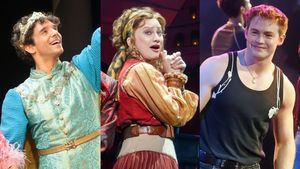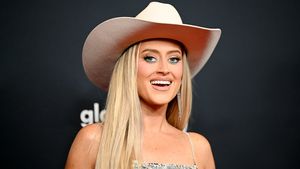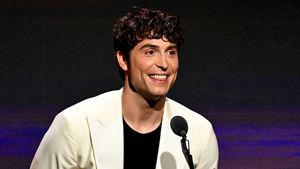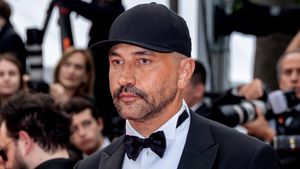Let’s be honest, the ‘90s were hardly the best time for queer representation — at all. But as we know, queer people did exist, and have always existed, even when the language to properly describe them didn’t. It’s just one of the ways in whichX-Men ‘97 and its inclusion of the nonbinary X-Men member Morph is so fascinating. The character never explicitly says they’re nonbinary in this 1997-set series, and yet they are here, they exist, and that visibility, even without labels, is powerful.
That rings true not just for us the audience, but for JP Karliak, the genderqueer voice actor who brings Morph to life in the series, too. “There's a beauty of just letting him exist," Karliak tells PRIDE. “So many of our stories are just so steeped in the transition or the coming out, and we're more than that. There's so much more going on than that.” But despite the lack of labels, Morph’s identity is one of the many potent metaphors for otherness that the X-Men stories are ultimately about.
[SPOILER WARNING FOR X-MEN 97 EPISODE FIVE AHEAD]
That has never felt truer than in the aftermath of a recent episode in the series that saw the peace of Genosha, a country populated with mutants destroyed by a terrorist attack that left many of the populace, including the beloved mutant Gambit dead in the shocking act of violence. If you felt the echoes of 9/11 or the Pulse nightclub shooting in those horrific scenes, it’s because they both served as inspiration for former executive producer, creator, and head writer Beau DeMayo when he pitched the series and wrote the episode. “If events like 9/11, Tulsa, Charlottesville, or Pulse Nightclub teach us anything, it’s that too many stories are often cut far too short. I partied at Pulse. It was my club,” DeMayo wrote on Instagram. “It was, like Genosha, a safe space for me and everyone like me to dance and laugh and be free. I thought about this a lot when crafting this season and this episode, and how the gay community in Orlando rose to heal from that event.”
Like many of us, Karliak immediately picked up on the references, and was profoundly moved by them. “Oh god, it is so heart wrenching,” he says. “Especially later to read Beau’s explanation of the inspiration for the episode and how it does take inspiration from 9/11 and from Pulse and from so many of the tragedies that we've experienced as a nation and also as a queer community. I was crying reading it! Every time I see the episode, especially the last three seconds of that episode. I'm a mess, just a mess.”
While X-Men has always been an allegory for the struggles of the oppressed, following this episode in particular felt like the perfect time to sit down with the actor to discuss what the series means especially to queer and gender nonconforming audiences. We also chatted about the importance of actors like him to be a part of telling these stories, his own journey with gender — and maybe even tease a little bit of what's to come with his character.
Speaking of which...
For those playing catch up here’s a little back story on Morph (disclaimer: yes, comic book fans, we are aware that Morph was introduced in the comics long ago; we’re going to focus on what we know about them from the original animated series as it leads into where we find them in X-Men ’97. Cool? Ok, let's get started.) They’re a member of the X-Men but one with a very complicated and traumatic history with the group. They’re one of the rare members who actually can consider themselves close to Wolverine, because they're just about the only person aside from Jean Grey who can make the Adamantium-clawed immortal laugh, let alone smile.
Their time with the group was seemingly cut short early on when they were killed during the X-Men’s first run-in with the giant Sentinel robots created to kidnap and kill mutants. However, in a twist of fate it was later revealed that Morph had survived; however, they had been turned by Mister Sinister into a villian filled with hatred toward the X-Men. After betraying their friends it was revealed that the hateful new Morph was actually an evil second personality which had been implanted by Mister Sinister. After he was rehabilitated he once again took his place as a member of the X-Men. Which is where we meet him when the new series kicks off.
PRIDE: Episode five was incredible and heart-wrenching to watch! How did that episode hit you personally?
JP Karliak: Because I wasn't in it, I had no idea what was happening. I was actually at a watch party for the Jubilee episode from the previous week. 'I was like, oh, yeah, I'm hosting this viewing party at Scum and Villainy, the Star Wars themed bar in Hollywood... next week.' They're like, 'Oh, you're [hosting] episode five? I'm like, 'mhm", and they're like [laughs hysterically] have fun!'
Finally I dragged it out of them because I was so freaked out and I actually was so panicked because we were so nervous about what people would think. I mean, especially A.J. [LoCascio] who plays Gambit, it could go so many different ways, even though it is so beautifully done, you never know how people are gonna feel about things. So, I woke up at like, 5 a.m. the day of to watch it in advance of the screening. So I was like, okay, am I going to need riot gear in order to host this screening?
Oh wow, how did that screening go? Was there a dry eye in the building?
Half of them had seen it, half of them had luckily for people that had kept their mouths shut. It was fun to watch the people that hadn't seen it. Some people had been like, really feeling their feelings about Gambit being so screwed over by Magneto and Rogue… and then everything hits the fan.
It was silent. There was the gasp when the initial injury [happened]. There was the cheer for how badass he goes out. But then the whole rest of the episode was just silence. It's a lot to take in and it does reflect so much of what we have seen on the news.
Speaking of Beau DeMayo’s statement, the idea of our stories being cut short is such a refrain in our queer histories, whether that was the AIDS crisis, or violent acts like the Pulse nightclub shooting which is something Beau said served as inspiration for the episode and the series. What do you think about that?
It's gutting and yet, it's so necessary. We all know theX-Men are an almost thinly veiled metaphor for the civil rights movement, and also the queer rights movement, and any oppressed people can really find themselves in the X-Men. But it's a universal show, anybody can watch it. And I feel like so much media that has talked about our lives as queer people has sometimes been poo-pooed into the corner as a niche, like there's a certain audience who are going to watch it.
We were talking the other day about the show We're Here on HBO, it's one of the most beautifully impactful shows I've ever seen in terms of addressing the small town experience of queer people. But because of what it is in and of itself I know so many people who are cis or hetero, who are just like, 'Wow, I've never heard of it. What is that show?' It's only reaching the choir and [X-Men '97] is a show that's reaching everybody. As soon as you tell them like, 'Did you see that? Did you see how you felt? Did you see what that experience is? That's what it is for us.' That's what hits. [It’s] that allegory that really drives it home.
Pulse was several years ago, but we're with all of the trans violence we're experiencing right now it is still happening every day to our community and to just have that reference point seen worldwide. It's so vital.
On the subject of metaphor and subtext, something so interesting about the show is that because it's set in the ’90s, Morph never says “I’m nonbinary” and yet they are. Can you talk a little bit about the ways that the show speaks to that without having the language or cultural consciousness around gender that we have today?
There is something interesting about Morph being a shapeshifter, and also being non binary. What I take away from Morph's experience — there's so many things — as somebody who identifies as genderqueer himself in his 40s, I didn't have that vocabulary. And genderqueer was a term that came out in the ’90s but just in the ’90s. So it wasn't something we heard in a small town Pennsylvania, and god I wish I had that vocabulary. I wish I could've seen somebody that exemplified that in a way that I was like, 'Oh. Me That.' Which is not something that I had until my late 30s. I identify with Morph's experience.
Somebody asked me why he has a gray face now? I don't know the official answer to that but I will say a couple things: One, I think as somebody who's experienced so much personal trauma, and looks in the mirror and sees the face that experienced that trauma and betrayed his friends while wearing that face, maybe you don't want to have that face anymore. Maybe that's not, maybe that's not the face you want to look back at.
But also, what if Morph is just like — Oh, God, don't make me get emotional. How dare you! When I got married, I put on fake lashes and makeup for the first time, because I wanted to be my truest self walking down the aisle, and saw myself in the mirror and was like, 'Oh, that's me.' Maybe Morph, who has the ability to fully shapeshift is tweaking it to find like, 'That's me. That's who I am.' I think in a really subtle way that we may never see the full mechanics behind, we're watching the gender journey of Morph.
As soon as the show was announced I was bracing for the inevitable narrative that X-Men had gone woke. What do you think about this critique?
It's like, 'Where have you been? What X-Men did you consume thinking that [it wasn't]?' It's in every movie, regardless of whether it's the best X-Men movie or not the best X-Men movie, it's still in every X-Men movie. So even if that's all you've watched, you're still it's still the message that you are missing clearly. Look, honestly, for me all press is good press. So I let them talk. I don't mind.
You’re also a passionate activist who created the non-profit organization Queer Vox, which offers training and support to queer voice actors, and fights for equitable and authentic representation. With that in mind, can you talk a little bit about the importance of queer actors voicing queer characters like Morph?
I do think it's important in a situation like this that I can speak to that experience, as opposed to talking about how I did my 'actors research' to figure out what that strange non binary person feels like. Or I could just be it and then just be funny — it's not rocket science.
But more concretely, I always shy away from getting into the discussion of like, who has the talent or who has the wherewithal to be able to play certain roles because, look, we've all seen Stanley Tucci play something — there are queer roles played by cis and hetero people that are good and affecting and beautiful. But for me, it's more about a case where a cis or straight person made wealth telling a queer story and a queer person didn't. And that's the issue, it's being able to build a career.
I know you can't spoil anything, but can you give us a little hint of what’s to come from Morph this season? Are we going to get some more in the back half of this season?
I wonder... I don't know what we're gonna do. But here's what I hope we do: I hope that Wolverine and Morph stay friends because I think a platonic relationship between queer people and straight people is actually far more interesting then another queer person pining over a straight person. I hope that Morph maybe gets a romantic interest of their own. And I hope that Morph gets to kick the crap out of Mr. Sinister because we all deserve to see our trauma quashed.





































































































































